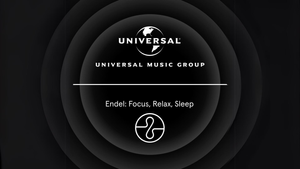Universal Music has announced what it is calling a “first of its kind strategic relationship” with Endel, a music AI company that provides, and I quote, “personalised soundscapes to help you focus, relax, and sleep – backed by neuroscience”.
Under the deal, Universal-signed artists will collaborate with Endel and its technology to enable them to “create science-backed soundscapes, designed to enhance listeners’ wellness, including both new music and new versions of catalogue music”.
Endel is the app that Universal-signed James Blake worked with to create his ‘Wind Down’ soundscape, which was then released as an album last year, and of which he said: “I think we’ve invented something not just beautiful or even meaningful, but truly practical”.
In terms of how it works, the official blurb explains that “Endel uses artist-provided stems to create soundscapes driven by scientific insights into how music affects our mind-state. When crafting static albums, artists and their teams have the final sign off on the results they prefer”.
“These soundscapes provide artists and rightsholders new opportunities to generate additional revenue for their catalogues”, it goes on, “while expanding and enhancing their work into new areas and moments in fans’ lives, while aspiring to support wellness for the listener”.
It’s an interesting deal because it touches on two topics that Universal has been quite opinionated on recently: music-making AI and functional audio.
On the former, the major has been warning the creators and users of AI-powered music-making tools that it will take action if they train said tools with data linked to Universal-owned songs and recordings without licence. And they have been seeking to stop the streaming services from distributing tracks that are seemingly the result of unlicensed crunching of its music by AI.
In terms of functional audio, Universal boss Lucian Grainge had been very vocal indeed about the problem of mood music and background noise on the streaming services being treated the same as more conventional music when it comes to digital income being allocated to tracks each month. Grainge – and others – are proposing a new approach that would reduce the money flowing to more functional sounds.
Perhaps with all that in mind, Universal was keen to stress that its partnership with Endel “will always respect creators’ rights and put artists at the centre of the creative process”. The music industry is keen, of course, to stress that it recognises the opportunities as well as the threats that come from ever more sophisticated generative AI technologies, and Universal presumably sees what can be achieved by the Endel partnership as being one of the positives.
As for the debate around functional audio, while it’s easy to distinguish between conventional music and white noise or bird song, when it comes to mood music to help people relax or sleep, the line is much more blurred. So if any grand plan to reform how streaming monies are shared out can’t exclude mood music from the main pot of royalties, maybe Universal and its artists can get involved in that side of streaming instead.
Or, maybe consumers can be persuaded to use specialist apps for this kind of audio rather than accessing it via the music streaming services. Endel does make music available via playlists on all the streaming platforms but also has its own app. If dedicated apps can offer a better functional audio experience, perhaps less of that content would be consumed on Spotify et al, leaving more digital income to be allocated to more conventional music. Who knows?
“At UMG, we believe in the incredible potential of ethical AI as a tool to support and enhance the creativity of our artists, labels and songwriters, something that Endel has harnessed with impressive ingenuity and scientific innovation”, says Universal Music’s Chief Digital Officer Michael Nash.
“We are excited to work together and utilise their patented AI technology to create new music soundscapes – anchored in our artist-centric philosophy – that are designed to enhance audience wellness, powered by AI that respects artists’ rights in its development”.
Endel CEO Oleg Stavitsky adds: “Endel has been artist- and human-focused from day one. Our goal was always to help people focus, relax and sleep with the power of sound”.
“AI is the perfect tool for this”, he reckons. “Today, seeing our technology being applied to turn your favourite music into functional soundscapes is a dream come true. We’re extremely excited to put Endel AI to work and help UMG build new and exciting offerings to promote wellness and banish the perceived threat around AI”.

